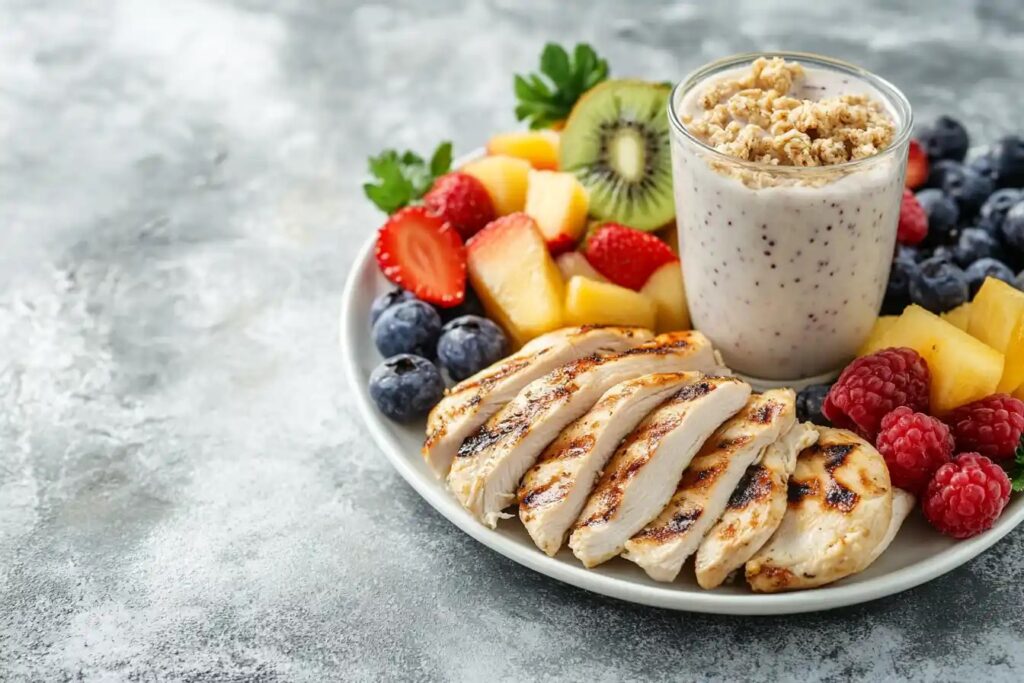Breakfast sets the tone for the day, fueling your body and mind for everything ahead. With so many options, deciding between eggs and chicken for breakfast can feel like a challenge. Both are protein-packed and nutrient-rich, but they serve slightly different needs. In this article, we’ll dive into the nutritional, health, and practical aspects of each, helping you decide which is better for your plate.
Introduction to the Nutritional Debate
The Popularity of Eggs and Chicken in Breakfasts
Eggs have been a breakfast staple for centuries. Whether scrambled, poached, or boiled, they’re versatile, quick to prepare, and pack a nutrient punch. On the other hand, chicken has become a rising star in morning meals, especially for fitness enthusiasts who crave lean protein. From grilled chicken wraps to breakfast burritos, its adaptability is unmatched.
Both foods cater to different needs, and preferences vary widely. Some love eggs for their simplicity, while others choose chicken for its hearty, savory appeal. But what makes one better than the other?
Why Compare Eggs and Chicken?
Eggs and chicken are both high in protein, making them excellent choices for a filling breakfast. However, their differences go beyond taste. Eggs provide a variety of vitamins and minerals, including B12, selenium, and choline, while chicken offers more concentrated protein and fewer fats (if you opt for skinless breast).
This comparison matters because the nutritional value of your breakfast can impact energy levels, weight management, and overall health. Understanding these nuances helps you pick the right option based on your health goals and lifestyle. Whether you’re managing cholesterol, building muscle, or just trying to stay full until lunch, the answer lies in the details.
Stay tuned as we explore the specifics of nutrition, health benefits, and potential downsides for both options. Could eggs and chicken even be combined? Let’s find out!
Nutritional Comparison of Eggs and Chicken
Macronutrients: Protein, Fats, and Carbs in Eggs vs. Chicken

When deciding is it better to eat eggs or chicken for breakfast?, understanding macronutrients is vital. Both eggs and chicken shine in the protein department, but their compositions differ. A single large egg offers approximately 6 grams of protein along with beneficial fats that help sustain energy. On the flip side, a 3-ounce serving of skinless chicken breast delivers around 26 grams of lean protein with almost no carbs or fat.
While chicken may seem the better choice for high-protein diets, eggs balance this by providing healthy fats and a small amount of carbohydrates, making them ideal for long-lasting energy. For those watching their calorie intake, chicken breast comes in at just 140 calories per serving compared to the 70 calories in one egg.
Vitamins and Minerals: A Micronutrient Breakdown
Eggs are often lauded as nature’s multivitamin. They’re rich in vitamin B12, selenium, and choline, nutrients critical for brain function, immunity, and metabolism. Additionally, their yolks are packed with antioxidants like lutein and zeaxanthin, promoting eye health.
Chicken, particularly breast meat, isn’t as vitamin-dense but compensates with minerals like zinc and phosphorus, essential for bone health and tissue repair. If your goal includes muscle recovery or building strength, the concentrated protein and mineral profile of chicken might edge out eggs.
Caloric Comparison: Eggs and Chicken in Weight Management
Eggs, with their controlled portion size, are often viewed as the go-to breakfast for weight watchers. Two eggs provide around 140 calories and leave you feeling full thanks to their fat and protein content. Chicken breast, being more calorie-dense, works better for those with higher calorie needs or intense physical activity.
Including both eggs and chicken in your morning rotation is a smart way to reap the benefits of both. For more ideas on incorporating chicken into breakfast, explore recipes like Chicken Breakfast Recipes.
Health Benefits of Eating Eggs for Breakfast
Protein Powerhouse for Energy and Muscle Maintenance
Eggs are small but mighty when it comes to packing in high-quality protein. Starting your day with two eggs gives you about 12 grams of protein, ideal for maintaining muscle mass and keeping hunger at bay. Moreover, eggs contain all nine essential amino acids, which aid in muscle repair and growth.
For athletes or those with active lifestyles, eggs offer an affordable, nutrient-packed way to jumpstart recovery after early workouts. The fats in eggs also slow digestion, ensuring sustained energy throughout the morning.
Rich in Good Fats and Essential Nutrients
Egg yolks, often misunderstood due to their cholesterol content, are actually nutritional goldmines. They contain omega-3 fatty acids that support heart health and brain function. The combination of good fats and fat-soluble vitamins like A, D, and E makes eggs a balanced breakfast choice.
Eggs also shine in convenience. They’re quick to cook, highly versatile, and pair well with other breakfast staples like vegetables and whole grains, adding to their appeal as a daily breakfast option.
Impact on Weight Loss and Appetite Control
One of the standout benefits of eating eggs for breakfast is their role in weight management. Studies have shown that egg-based breakfasts promote greater satiety compared to carb-heavy meals. This means you’re less likely to snack mid-morning, keeping overall calorie intake in check.
Incorporating eggs into a low-carb breakfast, such as scrambled eggs with spinach or boiled eggs with avocado, can further enhance their weight-loss benefits. For inspiration, check out simple breakfast recipes at Quinto Recipes.
Health Benefits of Eating Chicken for Breakfast

Lean Protein for Sustained Energy and Muscle Growth
Chicken, especially skinless breast, is one of the leanest protein sources available, making it an excellent choice for breakfast. Starting your day with chicken provides a hefty dose of protein—about 26 grams per 3-ounce serving. This is particularly beneficial for active individuals or those on high-protein diets. Its protein content helps repair and build muscles while keeping energy levels stable throughout the morning.
For those who engage in morning workouts or physically demanding jobs, chicken can be the fuel you need to sustain energy. Its lack of carbs ensures it fits well into low-carb or keto diets, further diversifying your breakfast options.
Low-Fat Options: Skinless Chicken Breast Benefits
One of the standout benefits of chicken for breakfast is its low-fat profile. Skinless chicken breast is virtually fat-free, making it ideal for those aiming to reduce fat intake without sacrificing high-quality protein. Unlike fattier meats, chicken breast doesn’t load you with unnecessary calories, keeping your meal lighter yet just as filling.
For more chicken breakfast inspiration, consider recipes like Chicken Breakfast Recipes, which offer a variety of options that combine flavor with nutrition.
Complementing a High-Protein Diet for Weight Loss
Adding chicken to your morning plate can boost satiety and help curb hunger throughout the day. Its high-protein content takes longer to digest, which means fewer mid-morning cravings. For those looking to lose weight, substituting carb-heavy breakfasts with chicken-based meals may help control calorie intake and promote fat loss over time.
Chicken is also highly versatile. It pairs well with eggs, vegetables, and whole grains, allowing for balanced and flavorful meals. Experimenting with spices and marinades can turn simple grilled chicken into a breakfast delight.
Potential Downsides of Eggs and Chicken
Cholesterol Concerns with Egg Consumption
One concern often associated with eggs is their cholesterol content. A single egg yolk contains about 186 mg of cholesterol, which is more than half of the daily recommended intake for some individuals. While recent studies suggest dietary cholesterol may not significantly impact blood cholesterol levels for most people, those with pre-existing heart conditions or cholesterol sensitivity may want to moderate their egg consumption.
For a lower-cholesterol breakfast, consider egg whites instead of whole eggs. These provide the protein benefits without the cholesterol found in the yolk.
Processed Chicken Products: Health Implications
While fresh chicken is a healthy choice, processed chicken products like sausages, nuggets, or deli meats can be problematic. These often contain high levels of sodium, unhealthy fats, and artificial additives. Consuming such items regularly can undermine the benefits of fresh chicken, contributing to health issues like hypertension or weight gain.
Choosing fresh, unprocessed chicken is key to reaping its benefits. If you’re unsure how to prepare fresh chicken for breakfast, check out simple recipes at Quinto Recipes to elevate your morning meal.
Food Safety and Allergies: Eggs and Chicken Risks
Eggs and chicken both come with potential risks related to food safety. Consuming undercooked or raw eggs can expose you to salmonella, while improperly cooked chicken may harbor harmful bacteria like salmonella or campylobacter. Practicing proper cooking techniques, such as thoroughly cooking eggs and chicken to the recommended temperatures, is essential for avoiding these risks.
Moreover, some individuals may have egg or poultry allergies, which can limit their ability to enjoy these foods. For those affected, alternative protein sources like tofu or legumes may be better options.
Which Is Better for Breakfast: Eggs or Chicken?
Personal Preferences and Dietary Goals
When it comes to answering is it better to eat eggs or chicken for breakfast?, the choice depends largely on your personal health goals and taste preferences. Eggs are perfect for those who value quick, easy meals with a balance of protein and healthy fats. They’re versatile, budget-friendly, and provide essential nutrients like choline and vitamin D.
Chicken, on the other hand, is a powerhouse for lean protein, making it ideal for athletes, bodybuilders, or anyone following a high-protein diet. If you’re aiming to boost muscle growth, chicken’s higher protein content might give it an edge. However, preparing chicken for breakfast often requires more effort, which may not suit everyone’s morning routine.
Scenario-Based Recommendations: Eggs, Chicken, or Both?
For weight loss and appetite control, eggs offer a satisfying start to the day, with their balance of fats and protein helping to curb hunger. Pairing eggs with vegetables or whole grains can further enhance satiety. If you’re focused on muscle recovery or maintaining lean mass, chicken might be a better fit due to its protein density and lower fat content.
Interestingly, combining eggs and chicken in a single meal provides the best of both worlds. A breakfast burrito filled with grilled chicken and scrambled eggs is a great way to enjoy their complementary benefits. Whatever your choice, ensure that your breakfast aligns with your overall dietary needs and lifestyle.
FAQs and Common Concerns
Should I Have Chicken or Eggs for Breakfast?
Both chicken and eggs are excellent options for breakfast, but the better choice depends on your specific goals. Eggs are quick, easy, and packed with nutrients, while chicken offers more concentrated protein and fewer fats. For a balanced approach, try incorporating both into your weekly meal plan.
Which Is Healthier: Eggs or Chicken?
The answer to this often-asked question lies in your health priorities. Eggs are rich in essential vitamins and healthy fats, making them a nutritious, well-rounded option. Chicken, being leaner and higher in protein, is better suited for muscle building and weight loss diets.
Are Eggs the Healthiest Breakfast?
Eggs are certainly among the healthiest breakfast foods. They’re nutrient-dense, versatile, and keep you feeling full for hours. However, balance is key—pairing eggs with vegetables, whole grains, or even chicken can create an even more nutritious meal.
Does Eating Eggs Count as Eating Chicken?
This common question stems from the fact that both come from the same animal. While eggs and chicken share similar origins, they are distinct in terms of texture, taste, and nutritional content. Eating eggs doesn’t directly equate to eating chicken, though they both make excellent breakfast options.
Conclusion
Summarizing the Nutritional and Practical Aspects
When deciding is it better to eat eggs or chicken for breakfast?, the answer depends on your health goals, dietary needs, and time constraints. Eggs stand out for their versatility, affordability, and nutrient density. They’re perfect for those looking for a quick, balanced meal that delivers protein, healthy fats, and essential vitamins.
Chicken, on the other hand, shines as a lean protein source, ideal for athletes or those prioritizing muscle building and recovery. While it requires a bit more preparation, its high protein-to-fat ratio makes it a staple for anyone following a high-protein or low-fat diet.
Both options have their merits, and combining them can offer a powerhouse breakfast that meets diverse nutritional needs. A breakfast burrito with chicken and eggs or a hearty chicken and egg scramble can deliver both taste and health benefits.
Final Recommendation: Eggs, Chicken, or Both?
Ultimately, whether you choose eggs, chicken, or a combination of both depends on your unique preferences and goals. Eggs might work better for busy mornings, while chicken offers substantial protein for physically demanding days. Experiment with different recipes and find what works best for you!
Long-Term Benefits and Variety in Breakfast Choices
Health Benefits of Switching It Up
While it’s great to debate is it better to eat eggs or chicken for breakfast?, incorporating both into your diet over time can maximize their benefits. Eggs provide essential fats and nutrients, while chicken boosts your protein intake without adding extra fats. Alternating between the two or even combining them ensures your breakfast remains diverse and balanced.
Variety in your morning meal isn’t just about taste—it also keeps you motivated to stick with healthy eating. By enjoying a mix of eggs, chicken, and other high-quality foods like vegetables and whole grains, you’ll cover all your nutritional bases.
Creative Ways to Enjoy Eggs and Chicken
To keep things exciting, try new recipes that blend eggs and chicken. A chicken and egg breakfast wrap, egg muffins with shredded chicken, or a protein-packed chicken omelet can make your mornings delicious and satisfying. If you’re looking for inspiration, explore recipes like Chicken Breakfast Recipes to find options that suit your palate.
Breakfast is a chance to nourish your body and set the tone for the day. By including both eggs and chicken, you’ll enjoy meals that are not only healthy but also packed with flavor and energy to power through your day!
